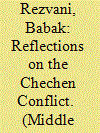| Srl | Item |
| 1 |
ID:
134234


|
|
|
|
|
| Summary/Abstract |
On a single day in July, when ambient tensions escalated, Palestinian militants fired more than 180 rockets into Israel, and the Israelis launched airstrikes against towns throughout the Gaza Strip. Dozens of Palestinians, most of them civilians, were killed. The order of daily urban life was disrupted, yet again, by warfare.
|
|
|
|
|
|
|
|
|
|
|
|
|
|
|
|
| 2 |
ID:
134485


|
|
|
|
|
| Summary/Abstract |
Why has Piketty's Capital become a publishing sensation? Not for revolutionary findings; its message that western societies have experienced increases in inequality of income and wealth over the long term is hardly new. Of the several reasons discussed in this article, attention is paid in particular to the book's timing and its claim to reveal the laws of income and wealth distribution in western societies. Had the book been published before 2008 it would have been much less successful. Piketty's revelation of the big trends and their underlying logic helps to objectify, legitimize and offer a kind of catharsis for surging middle-class anxieties during the Great Recession. These anxieties have been further intensified by evidence that over 90 per cent of the increase in disposable income in the United States has accrued to the top 1 per cent of the population in the past several years, and a not much lower percentage to the top 1 per cent in Britain. In the conclusion it is argued that if Piketty's forecasts are even remotely accurate, capitalism will lose its core claim to legitimacy.
|
|
|
|
|
|
|
|
|
|
|
|
|
|
|
|
| 3 |
ID:
134505


|
|
|
|
|
| Summary/Abstract |
The Chechen Conflict is the most fatal and protracted conflict in the post-Soviet space. While it is the most discussed conflict there, it is also the least understood. Many contradicting accounts of it exist, and still many questions remain unanswered. One reason is that the nature of this conflict has changed over time. Unlike what many - particularly Western - analysts think, it is not a religious conflict. It began as an ethno-nationalist separatist conflict but only later was it infiltrated by extremist Salafis/Wahhabis. At this moment a war is going on between the local Chechen and the central Russian governments against the Salafi/Wahhabi Emirate of the Caucasus. Chechnya is the only autonomous region in Russia in which a separatist movement had been successful. The possible reasons are the peculiarities of the Caucasus; especially its mosaic type of ethnogeographic configuration and the traumatic past of many of its peoples. Another important factor in the explanation of such a separatist conflict in Chechnya - and nowhere else in the North Caucasus - is the fact that only in Chechnya has a titular minority enjoyed a dominant demographic position. This paper also discusses issues such as the nature of Islam in Chechnya and the Russian geopolitical codes.
|
|
|
|
|
|
|
|
|
|
|
|
|
|
|
|